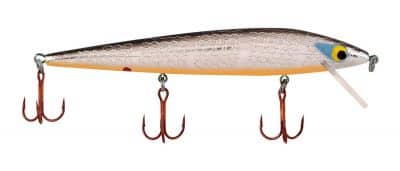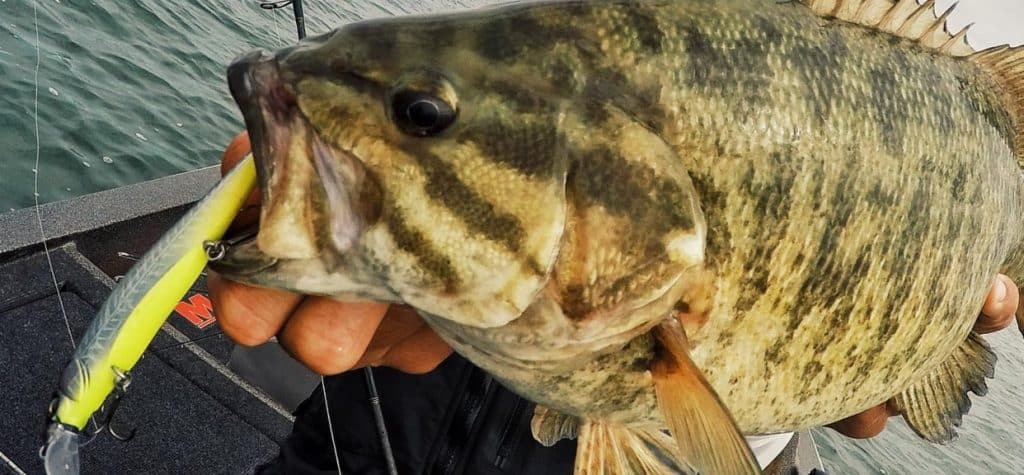Jerkbaits are easily one of my favorite lures for spring smallmouths. During the spawn it’s almost too easy to catch when they’re on their beds. Whether you’re a fishing guide or teaching your kid to fish, jerkbaits will almost guarantee a bass. More spring tournaments are won on jerkbaits than any other lure.
How to Catch Smallmouth Bass With a Jerkbait
When you get to any new lake the first thing you are going to want to do is check the water color. If the water looks clear or lightly stained you’ll be able to use a jerkbait.
I throw out my favorite Rapala X-Rap Jerkbait Lure whenever I can. If the water looks fairly clear I’ll throw out my X-Rap and see what happens.
When Not To Use a Jerkbait
The only time you shouldn’t use a jerkbait is when the water’s dirty. They definitely work best in crystal clear water.
In most northern and New England states you don’t have to worry about murky water. You start to run into trouble in the south where feeder streams tend to resemble coffee after a rain. Clarity will continue to get worse after the algae bloom.
Practice is the only thing that will tell you when there’s too much color. You should try and aim for visibility down at least 4 feet into the water.
Where To Fish JerkBaits For Smallmouth Bass
There’s no one simple answer of where you should fish jerkbaits. It depends on the time of year, or more specifically the spawn.
You’re going to want to change up your location as you work through the spawn changes. Early in the season try and look for pre-spawn habitats.
With your fish finder look for drop-offs and deeper secondary points near spawning flats. I like to target sunny coves and deeper ledges next to spawning flats.
Fishing Jerkbaits Throughout The Year
During the actual spawn you’ll want to hunt for bass near shallow coves, and calm flats. Look for areas that get a lot of sun in the afternoon.
If you manage to find those areas you’ll definitely catch some great smallmouth bass. Once the spawn is over back off to deeper water.
Other then quick feeding blitzes, bass tend to stick to deep water later in the year. Look for shallow water feeding frenzies early and late in the day on overcast days. Smallmouths also tend to stick around spawning areas a few weeks longer than largemouths.
Seasonal Jerkbait Tactics to Catch Smallmouth Bass
The time of year is going to completely change which jerkbaits work best. Luckily choosing a jerkbait isn’t as difficult as finding the right crankbait or worm.
The choices are limited to a handful of decent brands and only a few choices to use throughout the year. Just like changing location during the spawn, you’re going to have to change jerkbaits throughout the spawn.
Early Spring Jerkbait Fishing
In the early spring I like to use a suspended rouge jerkbait. Most of the time I use one of the Smithwick Suspending Rogue lures. Smithwick lures are affordable and come in a wide variety of colors. I like to stick with bigger lures between 4.5″ and 5.5″ long.
Smallmouths tend to want a big meal around that time of year and the big lure has the right action for cooler water. During spring a lure really needs to be able to suspend when the water is in the 50’s. Smallmouths are much less willing to chase a bait and aren’t willing to expend much energy to eat it.
If you put a suspending rogue right in front of a smallmouths nose there’s a very good chance he’ll bite it. You need to bring a good pair of polarized sunglasses that will allow you to spot fish bass.
During the prespawn phase target main lake points that are about 15 feet deep. Simply cast your lure across those points. Jerk your lure to get it down and let sit for a while. I like to let it sit somewhere between 5 and 7 seconds. Change up your technique as the water starts to warm up or cool off.
How to Use the Ripping Technique to Fish Jerkbaits
In early spring before the water warms up I like to use the “ripping technique”. When the water’s between 38 and 45 degrees I like to use a lure with an oversized bill. It’s real simple, and accounts for a ton of real nice smallmouths.
The key is to throw the lure out as far as you can and then rip it back as hard as possible. Pause only as long as it takes to wind up the slack. Sweep the rod hard and reel it in again and repeat.
The length of the pause only needs to be a few seconds. Try and experiment with different pauses until you determine what the fish want.
The bass will normally be suspended about 10-15 feet down and the lure will get down to about 8feet. Fish shouldn’t have to move far to hit the bait. Like me fish don’t want to get a lot of exercise on cold mornings.
The only way to know if you’re doing the technique right is to start catching fish on a cold day. By the end of the day you’ll definitely get in a good workout.
Prespawn Jerkbait Fishing
You’ll quickly learn that in spring, smallmouth bass won’t bite a paused sinking jerkbait. Largemouth Bass might hit, but smallmouths definitely won’t.
In cold weather you’ll want something like the Rapala X-Rap Deep Fishing Lure. It can almost get down 14 feet right in the face of staging smallies. Most bass look upward so it’s not uncommon for smallmouth to rise to a lure suspended right above them.
I like to search for bass right around rock bluff walls and in quiet coves. Coves that receive a lot of direct sunlight are easy pickins on cold days.
Throughout the day those sunlit coves tend to attract bass looking for a little extra heat. As bass tend to move to the spawning flats I like to switch to Rapala’s Shadow Rap Shad. Slow-risers and slash baits are perfect for agressive smallies.
Summer Fishing
When I’m out fishing during the summer I always like to keep a jerkbait rod somewhere on deck. Once the bass move off their beds I stop using suspended baits and switch to floating stickbaits.
Instead of using my the slower jerk-pause, jerk-pause technique I switch to more erratic jerking movement. When the water’s warm so are the fish, so you want to move everything faster. Move your bait fast pausing it for only a split second. Floating models tend to have a different wobble that fish like when its warm.
You can also use the jerkbait as a reaction lure. It really doesn’t matter whether it sinks rises or suspends as long as it’s a good color. Try surface busting schooling bass that appear suddenly. You won’t leave it in the water for long so it really doesn’t matter how it performs. During the summer months I really like to the versatility of Rapala’s Shadow Rap Shad. With its deep dive you can work it in a wide variety of situations from spring to late summer.
Fall Jerkbait Fishing
As water temperatures start to fall I tend to switch towards a shallow jerkbait. Bass stay closer to the surface and eat up my Storm Twitch Stick Lure.
Fall is the time of year you can clean up the flats in northern lakes. With a jerkbait you’ll be able to catch both small mouths and largemouths. Most of the time a jerkbait will even outproduce crankbaits, spinnerbaits and swimbaits.
Fixing Short Striking Smallmouths
It’s not unusual for bass to follow jerkbaits all the way back to the boat without striking the lure. Bass will nip at the lure as it moves through the water, but won’t commit. It’s frustratingly common how many bass won’t commit to a meal.
The most important aspect of curing short strikes is knowing bass are actually doing it. A lot of times guys don’t even realize bass are nipping their baits. That’s why they really need to bring along a good pair of polarized sunglasses. You’ll be able to see how fish are reacting to your lure.
It’s really common for bass to rush a lure only to nip at the tail and miss the hook. When you see this you should change things up a bit. An adjustment to the lure color or retrieve speed can make a huge impact.
Moving the lure faster gives the appearance of a frightened baitfish. It should excite the bass into actually making a strike. Just be careful not to overdo it in colder months.
I also like to keep another follow up bait like a floating worm on my boat. Fish that follow a jerkbait back to the boat are often the first to strike a worm. Just let it fall slowly into the water and wait. They’ll often swim away when they see the boat and turn around looking back. Those are the types of fish that will take a follow up bait.

